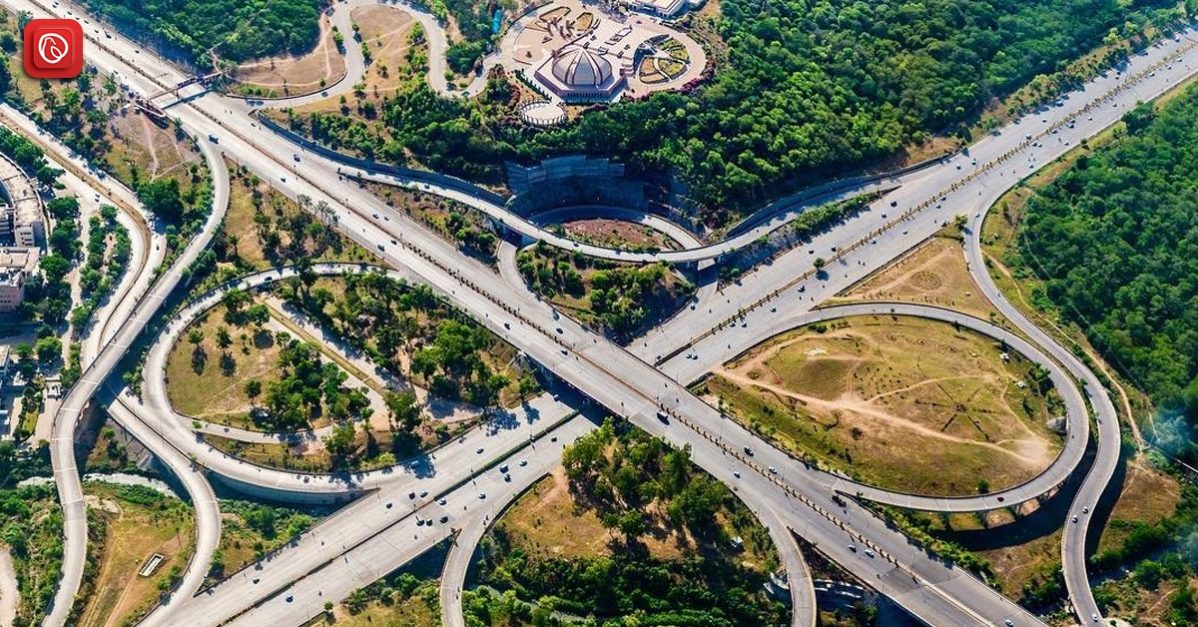
Source: Graana.com
The Zero Point Interchange in Islamabad is a famous landmark, but its name, “Zero Point,” holds a unique historical tale from the early days of Islamabad’s development.
The Zero Point Interchange in Islamabad, Pakistan, is a significant road junction where Islamabad Highway, Srinagar Highway, and Khayaban-e-Suharwardy meet. It was opened on July 5, 2011, and is expected to be in use for around 30 years.
Graana.com has prepared a detailed guide on Zero Point Islamabad, Pakistan, including its history and much more.
Back in 1997, a French company was commissioned to undertake the planning of a project. However, the Capital Development Authority turned down their proposal due to a combination of technical issues and political interference. Eventually, construction work began on September 11, 2008, with project director Mumtaz Hussain leading the supervision efforts.
Furthermore, they split the project into two distinct phases. In the first phase, they built three significant loops, and in the second phase, they added two additional loops to connect Shakarparian and Khayaban-e-Suharwardy. The project required precise attention to detail due to its high complexity.
The budget for the project was initially set at Rs. 2.75 billion, but due to irregularities, it faced delays and cost escalations, eventually reaching Rs. 4.1 billion. Most of the work was completed despite missed deadlines, and some adjacent link roads were opened. Prime Minister Yousaf Raza Gillani officially inaugurated the interchange on July 5, 2011, although construction on one loop was still ongoing. They completed the entire interchange in 2012.
The Zero Point Interchange, located at Srinagar Highway, H 8/3 H-8, Islamabad, Islamabad Capital Territory, Pakistan, serves as a popular local attraction and is classified as a bridge.
Here are some of the most popular attractions near Zero Point in Islamabad:
Islamabad View Point is a famous tourist spot in Pakistan’s capital city. Visitors enjoy breathtaking views of Islamabad, including the Margalla Hills, Rawal Lake, and Faisal Mosque. Families often visit for picnics and outings.
Shakarparian View Point, situated on Shakarparian Hills, offers stunning city and mountain views. It’s home to the Pakistan Monument, a symbol of national unity, inaugurated in 2007. The monument, made of granite and marble, represents Pakistan’s provinces and Islamic faith.
The Pakistan Monument, situated on Shakarparian Hills in Islamabad, is a significant national symbol. Inaugurated in 2007, it stands as a top tourist destination in the city. Crafted from granite and marble, the monument features four petals rising from the ground, uniting to create a crescent and star. These elements symbolise Pakistan’s four provinces and the Islamic faith.
The park located in Sector F-9, named Fatima Jinnah Park, honors the sister of Pakistan’s founder. Families love picnics, walks, and the park’s amenities like playgrounds, a lake, and a fountain.
Lok Virsa Museum, found in Sector F-6, showcases Pakistan’s folk heritage. The museum displays traditional costumes, jewellery, crafts, and more. It hosts exhibitions and cultural events.
Lok Mela, an annual festival in Islamabad and other cities, celebrates Pakistan’s rich heritage. Moreover, the event features traditional food, music, dance, and crafts, offering a vibrant cultural experience
Zero Point Interchange stands as a vital hub in Islamabad, connecting major highways and facilitating the smooth flow of traffic. Its unique design and strategic location make it a significant landmark in the city. While primarily serving as a traffic intersection, it indirectly contributes to the development and connectivity of the surrounding areas. For travellers, utilising navigation apps ensures easy access to this important junction.
A1: Zero Point Interchange is a major road junction in Islamabad, Pakistan, where Islamabad Highway, Srinagar Highway, and Khayaban-e-Suharwardy intersect.
A2: Zero Point Interchange became a significant landmark in Islamabad when it was inaugurated on July 5, 2011.
A3: ECIL designed Zero Point Interchange, and Mumtaz Hussain served as the project director, overseeing its construction.
A4: The unique design and seamless connectivity of Zero Point Interchange facilitate smooth traffic flow between key highways in Islamabad, earning it recognition.
A5: While primarily a traffic hub, Zero Point Interchange is not a designated tourist attraction. However, its distinctive architecture and strategic location make it a point of interest for some visitors.
A6: Zero Point Interchange primarily serves as a traffic intersection, and there are no specific facilities for tourists. However, nearby areas offer various amenities, including restaurants and shops.
A7 The designers of Zero Point Interchange have not included designated pedestrian pathways; it is specifically designed for vehicular traffic. It is essential to adhere to traffic rules and use designated pedestrian crossings in the vicinity.
A8: While Zero Point Interchange does not have direct historical significance, it plays a vital role in Islamabad’s transportation network, contributing to the city’s development.
A9: Local authorities or official announcements are the best sources for obtaining information about upcoming developments at Zero Point Interchange. Stay tuned to relevant news sources for the latest updates on city infrastructure projects.
A10: You can use online maps or navigation apps to find directions to Zero Point Interchange in Islamabad, ensuring a smooth and hassle-free journey.
If you want to know more about famous roads of Pakistan, follow the Graana blog.
Rawalpindi: The Rawalpindi Development Authority has said that the long-awaited Rawalpindi Ring Road project is…
Here is a concise, professional rephrased version of the news: Saudi Arabia Approves Regulatory Sandbox…
Islamabad: Chairman of the Capital Development Authority (CDA), Muhammad Ali Randhawa, chaired a high-level meeting…
The 19th Real Estate Development Summit Saudi Arabia – Luxury Edition concluded after two days…
Islamabad: The Shaheen Chowk underpass is expected to be inaugurated next week after nearing completion,…
Dubai’s luxury real estate market has reached a new milestone in 2025, with a prime…